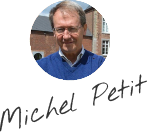From Upigny to UpignaG
A touch of south-western France in the Hesbaye
Discover this Walloon success storY
“We’ve proved that “little” Belgians can make foie gras that is just as good as that of our French neighbours!”
 Founder
Founder
A bit of pluck and a great deal of determination
Traditional farming was dwindling away when Michel Petit took over the large courtyard farm from his family predecessors in the 1980s (the farm has been in the Petit family since 1712). By chance, Michel met a French producer who was looking for business partner to start breeding ducks. This marked the beginning of the duck-breeding enterprise of the Petit family. When their French business partner closed up shop shortly after, the Petit family decided to themselves start bringing their fresh duck foie gras to fine food lovers in 1985. The beautiful farm in Upigny was also given a new name that captured its new touch of south-western France – Upignac.
An exceptional foie gras made in Wallonia
The Petit family was determined that they would only produce first-class, high-quality products. It’s why various family members travelled to the Périgord home of the foie gras to learn the ropes of the business from small producers. The Upignac products quickly became a leading product in the Belgian market because of their freshness and because they are vacuum-sealed. Until Upignac entered the market, Belgian consumers’ only choice was to buy canned French foie gras. The farm’s delicious products are today also sold in a fast-growing number of Upignac stores. To meet the growing demand for its products, Upignac built a new, large workshop in 1993. Situated close to the farm, it is compliant with the most stringent EU norms. Since 1997, fine food lovers have also been able to get Upignac products at their local supermarket (Delhaize).
Our commitments
Our foie gras and fruit juices are the product of the combined expert knowledge of different kinds of craftspeople. All our production methods must benefit the taste of our products and meet the most stringent hygienic requirements. “We are constantly looking for ways to improve our production process and developing new recipes that will delight our discerning customers, while simultaneously meeting all of the relevant regulations.” (Michel Petit)
When it comes to the legal rules aimed at the well-being of the ducks that are used to produce foie gras, no country in Europe has more stringent legislation than Belgium. Over the last 30 years, we have developed a balanced process that allows us to produce the best possible foie gras while at the same time upholding high animal welfare standards.
Ferme d’Upignac is a family-owned company with strong ties to the Hesbaye region. We employ some 40 workers and craftspeople locally. We support our employees and are committed to helping them grow. The atmosphere on the work floor and the company loyalty of employees is the best example of that. Our workshop doesn’t have very many machines because we prefer to use artisan manual labour to create our delicacies. Our farm is committed to craftsmanship and not to churning out industrially made products. We have always guarded that our growth as a company wouldn’t jeopardise our family spirit and values. To strengthen our ties to the local community, we organise a Christmas market every year. We also plant a field of flowers every year and invite locals to pick their own bouquets for a pay-what-you-want contribution.
We put considerable effort into the sustainable management of our pastures, orchards and fields. In as much as possible, we try to use natural products to protect our crops. We for instance planted several hays that are excellent at absorbing water while also serving as a refuge for all sorts of small animals. Drip irrigation is used to combat water wastage during dry periods. We place perches in our orchards so as to attract birds of prey so they can drive out the mice that eat away at the roots of our fruit trees. We also put up nest boxes to attract the smaller birds that eat the caterpillars that are harmful to our trees.